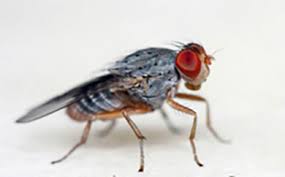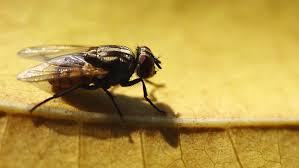Pest Management Solutions for Your Business
Flies are one of the most encountered pests in and around commercial properties, especially in the summer months when temperatures and pest pressure rises. Aside from being a being a nuisance, flies can spell trouble for food service outlets and food processing, healthcare and hospitality facilities.
Flies Are A Public Health Threat
Preventing fly infestations in commercial kitchens, food processing facilities and other commercial properties is an ongoing challenge.

Fruit flies are a common problem in food service facilities.
Small flies (drain or fruit flies) might be small, but they can cause big problems. Flies are wiling transmitters of diseases such as E. coli, salmonella, or listeria as they transfer harmful bacteria on food, food preparation or dining surfaces after feeding on waste materials.
As warmer temperatures push thermometer readings up, the rate of decomposition of the food sources flies like to feast on increases. From fresh produce to garbage, compost and animal feces, the quicker this material spoils, breaks down and starts to smell, the more flies love it.
Fly infestations are usually the result of exterior doors being left open and missing or damaged screens on windows, doors and air vents. Drive up windows in banks, pharmacies or other retail outlets are another common entry point.
Over its many battles with flies in commercial properties, Sprague has learned that prevention is the first step to fly management. This includes employing good sanitation practices, making an accurate identification of the fly specie, identifying the source of the infestation and breeding locations, and sealing up access points.
Fly Management/Prevention Strategies
Once the fly specie and the source of the infestation has been identified, it is time to put an integrated pest management plan in place.
Strategically placed insect light traps will help measure the effectiveness of your sanitation and other fly prevention efforts, and exterior traps and treatments can knock down infestations and lessen fly pressure around commercial properties.
Drain and fruit flies breed in stagnant liquid that builds up in clogged drains and garbage containers. Prolific breeders, the flies will hover in large numbers –in and around their breeding location.
Regularly cleaning of floor drains — all the way to the drain trap where food materials and waste materials build up — in kitchens and production areas will remove decaying debris that can build up and attract flies, especially filth flies.
Good Sanitation Practices
Good sanitation practices in and around your facility are critical to keeping flies from gaining a foothold. When you consider a single garbage can that is not emptied can be a breeding ground for thousands of flies, you’ll think twice about waiting to take out the trash.
Use tight-fitting closures for garbage and recycling receptacles, and to empty, clean, and dry them on regular basis. Keep food preparation, storage and serving areas clean of grease spills, crumbs and other food particles. Trash bins and dumpsters should never be placed near the building but at least 50 feet away from potential entry points (i.e., doors, windows, etc.)
Proper Identification
Correctly identifying the fly species infesting your facility is the first step to gaining control and eliminating the problem. A correct identification will allow a treatment plan to be designed that is customized to your property and the fly specie involved. An incorrect identification can lead you on a wild goose chase wasting valuable time and resources.
Exclusion Practices
Denying flies access to your property is another important part of the plan. Work with your maintenance staff and pest management service provider and perform a thorough inspection of your building to identify potential entry points. Create a ‘seal’ at these entry points (exterior loading dock and entry doors, ventilation openings, windows, etc.) by staying on top of regular maintenance and repairs.
For more information on how Sprague Pest Solutions can assist you create and deliver an effective fly prevention or management program, call 855.805.0755.

